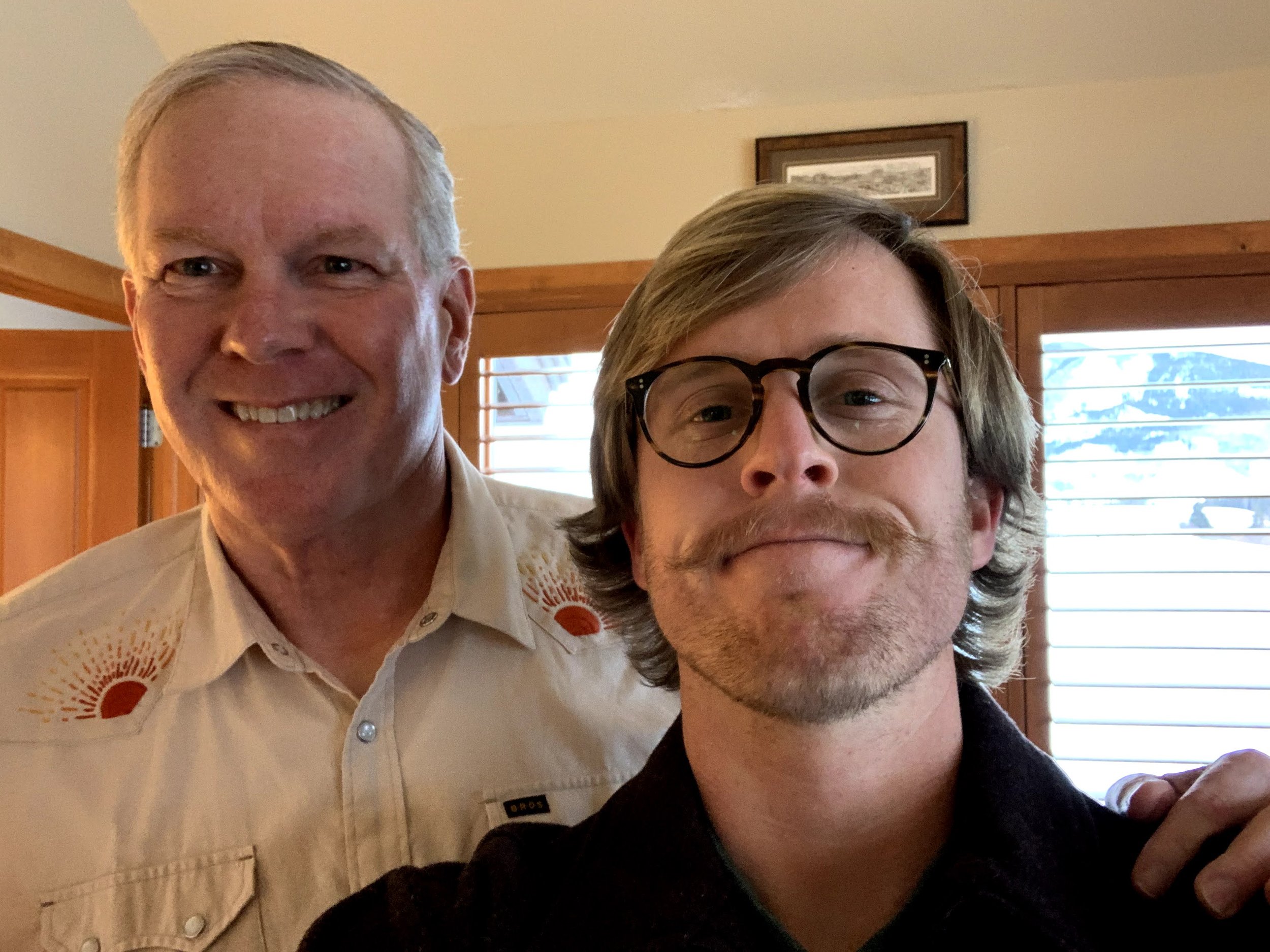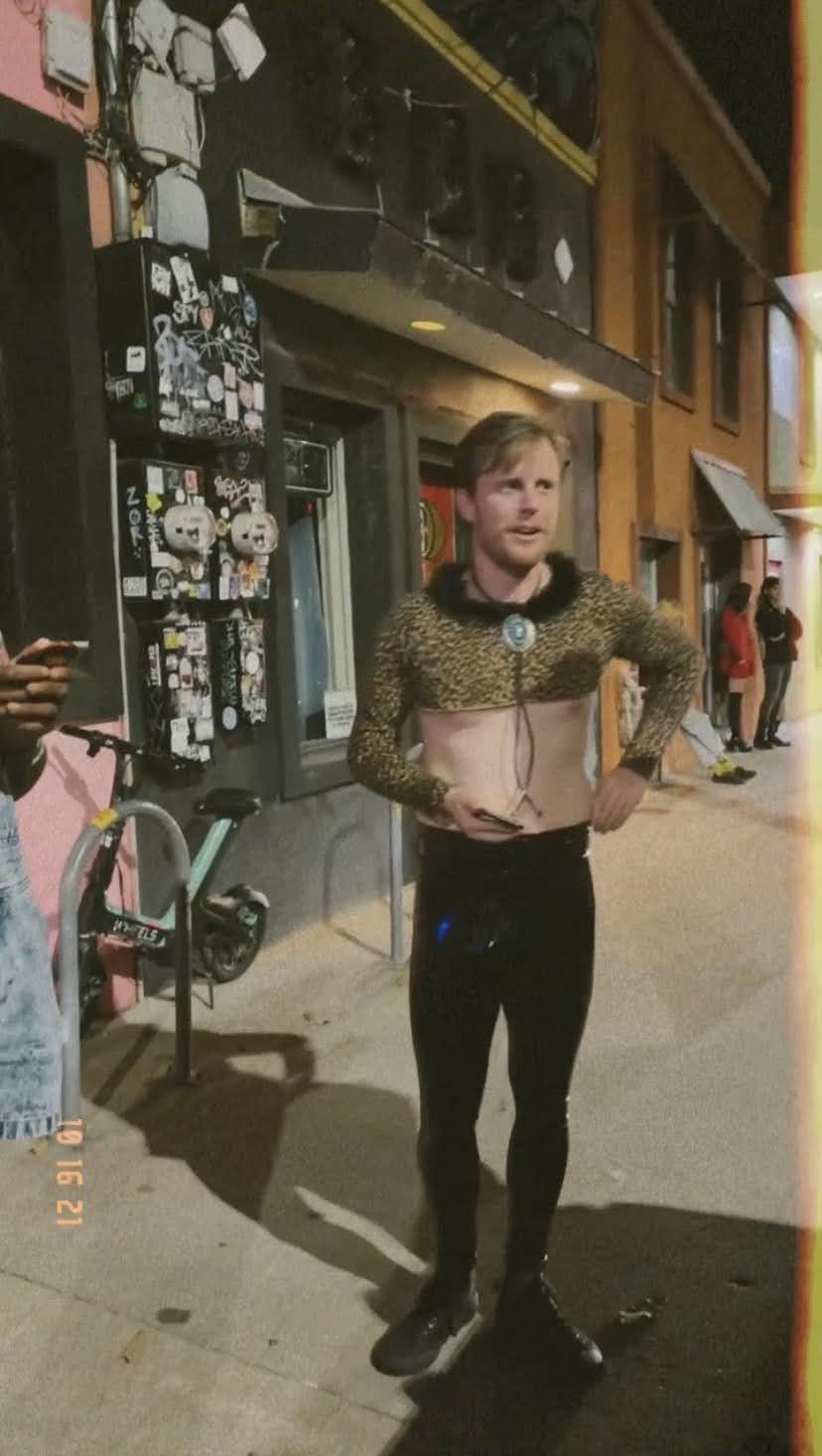And to that I say…yee haw
Another year has somehow passed by, for those of you that don’t believe time is a flat circle. Life has felt like a series of little moments splattered onto an ever-evolving canvas, which has been fun because I can’t paint. It’s like I’ve stepped in gum and am tugging at the fabric of space & time with each step. For now, I’ve scraped the gum off and sat down to recap the happenings of my 2021. All and all, it was a good year that I’m happy to hang my hat on. My family is healthy, I’ve managed to maintain friendships, I’ve traveled as much as the pandemic has permitted, and I didn’t seriously injure myself along the way.
Some highlights: I survived the winter storm, got vaccinated, surprised my dad for his birthday, finished a D&D campaign, had some great dinner parties, visited both my grandmas for the first time in 18 months, camped in the wilds of Arizona, suffered through a spring in Rochester, went to the first Austin FC game with my brother, escaped the heat in Colorado with family and friends, bought a real-life matchbox car, ticked off Mt. Stuart, endured a busy Fall with work, celebrated Festivus with the largest crowd yet, officiated two weddings for dear friends, and spent the holidays with my family.
Grandma & Gram
This year’s recap is structured as follows:
By the numbers
Reading list & some book reviews
Quotes & notes
Random stuff I found interesting
Economic stuff I found interesting
Recommendations & requests
Mr. Medium (left) and lil’ Pocket (right)
By The Numbers
I was asked last year how I manage to keep running tabs on the various metrics I present herein. I started doing this a little over two years ago and haven’t kicked the habit yet. I keep two notebooks that are my daily drivers—lil’ Pocket and Mr. Medium (see above). They don’t really have names but calling them small and medium felt flat.
Lil' Pocket has my to-do lists for the days, both personal and work. Anything I find interesting I’ll typically jot in the back, along with ideas/things I need to remember. Mr. Medium has three parts: exercise, food, and notes. I’m not one to count calories or mull over patterns in my diet. I started keeping the medium notebook in 2020 with the goal of it becoming a habit. Now it has turned into a daily journal of sorts. All of this will hopefully accumulate into an archive that I can look back on in the years to come.
2021 by the numbers
66,153 minutes of music listened to
3,289 pictures taken
25 books read
77 movies watched
95 new beers
150 weekday workouts completed
210 morning walks for a total of 11,180 minutes (186 hours)
I averaged ~18 walks and 932 minutes per month
205 tacos consumed
At an average price of $3.50, I spent $717.50 on tacos. Assuming an average tortilla diameter of 5”, I consumed over 85 feet of tacos or 6 building storeys
Reading List
Chiang, Ted Story of Your Life Collection
Corey, James S.A. Leviathan Wakes
Corey, James S.A. Caliban’s War
Corey, James S.A. Abaddon’s Gate
Corey, James S.A. Cibola Burn
Corey, James S.A. Nemesis Games
Corey, James S.A. Babylon’s Ashes
Corey, James S.A. Persepolis Rising
Corey, James S.A. Tiamat’s Wrath
Didion, Joan The Year of Magical Thinking
Frears, Ella Shine, Darling
Fuller, Alexandra Don’t Let’s Go to the Dogs Tonight
Grisham, John The Firm
Grisham, John Camino Island
Kapil, Bhanu How to Wash a Heart
Kingsolver, Barbara Prodigal Summer
Knight, Phil Shoe Dog
Lansing, Alfred Endurance
Lewis, Michael Panic
Martin, Steve Born Standing Up
Murakami, Haruki The Hard Boiled Egg and the End of the World
Owens, Delia Where the Crawdads Sing
Rooney, Sally Conversations with Friends
Ware, Ruth The Death of Mrs. Westaway
Ware, Ruth The Girl in Cabin 10
Book Reviews
The Death of Mrs. Westaway - Ruth Ware
I listened to the book—the narrator was alright but her voices were lackluster. The main character, Hal, was a meek, down on her luck, mid-20s girl in Brighton. Suddenly she inherits a family fortune she didn’t know about. Overall the plot was blasé—the “twists” basically had road signs miles in advance. There was plenty of room to make the story much darker and/or thrilling. I would have loved if the author made the house itself more menacing than it was. Some of the other characters could have been developed better and been more integral to the story.
The pacing was fair—super slow start where she clearly tried to build something with the loan shark, but that storyline died off. Hal didn’t really grow throughout the story. She was largely the same at the end, even though “her life had changed.”
Overall, a lot left to be desired.
The Year of Magical Thinking - Joan Didion
Brutal, beautiful, and raw. Didion’s ability to convey her thoughts and feelings in a transparent and honest manner is remarkable. The structure of the story dovetails how she wrote it over the course of a year. She recedes into memories in the midst of current events, which is exactly how I imagine true grief is—not a linear life event, but rather one that comes in waves.
Didion does not answer anything or try and end it at a certain point. It is a heartbreaking read in which you are along for the ride. That said, there was never a “woe is me, the newly minted widow” moment to be found. The reader does not feel pity, nor does Didion ask for it.
The book is a window into a human soul that experienced an unfathomable loss that we all know will eventually come—the death of a person you love more than yourself; the loss of a partnership.
I would never start a Didion journey here, but for those familiar with her it is a must read.
The Girl in Cabin 10 - Ruth Ware
Once again, a non-winner from Ware. I think I am done with her for a bit. Wared out, if you will.
The narrator was rough this go around, chiefly because her accents were terrible (which dispels the suspension of disbelief). Her New York accent was especially bad.
Lo, the main character, was somehow meeker than Hal in Death of Mrs. Westaway. She was never a real protagonist: everything just seemed to happen to her. The internal monologues were her simply being anxious. The author leaned heavily on these monologues which made for a bore.
Rarely, if ever, did I reach the end of a chapter and feel the need to continue, to ask what happens next. This was rooted in Lo: I never felt, well, anything for her (including distaste). She was simply there.
After the second try, I don’t dare follow the adage “third time’s a charm.”
Shoe Dog - Phil Knight
Davis had gotten the book for Christmas and Tyler had recommended it to me as well. I finally gave it a read and it is one of the better memoirs I have read. Not too long, not too short. Not self-righteous, not self-deprecating. It strikes a wonderful balance of staying personal while being objective.
The story itself is fascinating, involving a true revolution of the running shoe. Not only that, but Nike was involved in the first wave of outsourcing to China, endorsing big-name athletes, having an early IPO, and changing running forever.
Knight paints an honest picture of his career and the time it took to build the company. Structuring it by year, you get to see both Nike and Knight grow together, as well as the concurrent world events. Additionally, Knight never gets political or pushes a business philosophy—a welcomed change from many others who quickly revert to a self-help-esque format. A very enjoyable read.
Born Standing Up - Steve Martin
Written and read by Steve Martin, he covers his early life that focuses specifically on his career in stand-up comedy. He kept it short and sweet, which each stage of his career being punctuated with personal moments. Overall it very much felt like an hour comedy special turned into a book.
At times he could get a little engrossed in various carnal conquests, but for the most part, he stuck to the trials and tribulations of his career. His style was very physical/nonsensical/absurdist—a first that was picked up on by some of my favorites.
He does not paint himself as an all-time great nor extoll his influence on the comedy scene. I enjoyed the bent toward stand-up rather than TV and film, as it is a whole different beast. I have a renewed appreciation for Martin’s humor (and banjo playing).
Prodigal Summer - Barbara Kingsolver
A fun book to read in the middle of winter. It was recommended to me as a personal favorite.
The story loosely follows three characters living in proximity to each other with some form of a connection between one another. All have their own unique love of nature: Deanna is a part of it, living in the woods as a researcher/steward with the Forestry Service. Lusa has an academic background in entomology but is thrown into a world of farming. Garnett has a traditionalist view and yearns to bring the American chestnut back from extinction.
Deanna is the most well-written and her relationship with the land was fun to explore. Lusa and the family entanglement was predictable at times but sweet as a whole. Garnett was the most vanilla—I was left wanting more. Overall a fun read from a new author for me.
Camino Island - John Grisham
First John Grisham book for me. I decided to give it a read on Madison’s recommendation. The plot line was fun—a book heist paralleled with young writer/old book store owner espionage. It is one of Grishom’s most recent books and is not his usual legal thriller.
The plot was easy to follow and he develops the characters well (excluding the heist guys). I’m not crazy about the way he writes women. She was the down on her luck southern gal who ultimately sleeps with the bookstore owner but in the end has not displayed any sense of true agency. She more is less is back where she started.
I did like the ending—the “good” guys did not necessarily win. Always a nice change from how these formulaic books turn out. Overall, I enjoyed it. I certainly want to read what Grisham is known for to get a true sense of his writing style.
The Firm - John Grisham
The second Grisham book for me and arguably his most well-known. I’d first head about it on a podcast episode discussing the movie. So, I figured I would give it a shot. His writing style is fairly boilerplate: less description (unless it is a woman) and more focused on plot/actions. The characters themselves were fair—Mitch was about what I expected. He never did anything that surprised me, other than fuck a prostitute on a beach and blatantly lie to his wife about it.
There were times where it felt very slow, especially when setting the scene in the first third of the book. He could have cut a lot of the fluff there. The female characters were either rough, good looking private eye secretaries, or a meek wife trying to be a badass. I had hoped for more depth with all of them.
Overall an entertaining audiobook, but I feel as if I could have put the paperback down. While it was a thriller, there was never a compulsion to keep going. I never connected with the characters on a level to feel concern or curiosity with what would become of them.
Don’t Lets Go To the Dogs Tonight - Alexandra Fuller
A wonderful autobiography/memoir of the author’s life growing up in Africa. Each chapter is a vignette, a brief snippet of her life that gradually build on each other until it reaches present day. She focuses more on her family than herself, but does step into the limelight when it suits her.
The writing is spectacular—she truly makes you feel like you are there with her. She balances the fine line of description: incredibly vivid imagery but not grandiose, drawn out paragraphs explaining every sensory detail. The images are formed in the reader’s mind based on the context she sets out for us. You can easily picture the characters and the world they are a part of. You feel for each of them in their own way—tragic, hope, sorrow, resilience, etc.
Overall it was truly an enjoyable read. I liked that it was not a linear narrative of her life. Each chapter was a specific memory, a moment in time that did not need further explanation. Her descriptions are brilliant as she portrays a totally foreign world in such an identifiable way. You feel like you’ve experienced a small portion of it with her.
Where the Crawdads Sing - Delia Owens
I had held off on reading this one for a while but finally got around to it. The backstory of the author did not cloud my reading, nor did my friends’ opinions of the book. It was a quick read, which had it been longer, it would have started to go downhill quickly.
I enjoyed the structure a lot, splitting between both timelines and characters while remaining centered on the story of the Marsh Girl. She creates a beautiful world that is both a part of and inhabited by Kya, a girl more creature than citizen. You truly got a sense that she sees the world as her world, free of outside influence even though she longs for connections. There are fantastically vivid moments with her exploring her own little kingdom.
The black characters were shallow and lacked, well, everything. She was unfortunately cliché and cringy with the way she wrote both Jumpin’ and Mabel which was disheartening. Additionally, Kya’s reactions to people were unoriginal for such a unique character. The poetry piece at the end got a major eyeroll as well.
Quotes & Notes
“The truth is that we live out our lives putting off all that can be put off; perhaps we all know deep down that we are all immortal and that sooner or later all men will do and know all things.” - Jorge Luis Borges
“When we read a story, we read with the same mind we use to read the world. So, concentrating on a story and the way we’re responding to it can tell us a lot about ourselves. I’ve found it so pleasurable and clarifying to tone everything out but that one story, those specific lines. Reading a story is, really, an exercise in believing that other people exist and are valid–the writer of the story, but also those fictive people. We get to practice caring about some people we don’t know–good practice for real life.” - George Saunders
Random Stuff I Found Interesting
Romanian Orphanages
Nicolae Ceausescu was the communist dictator of Romania from 1965-1989. During his tenure, he outlawed all forms of birth control and abortion. His hope was to build the economy by creating a massive labor force. However, and as expected, this plan failed. The country saw a spike in birth rates but could not adequately care for this generation of children. As a result, Romania had 170,000 orphans by the time Ceausescu’s reign ended. The stories are harrowing to read, but a sobering reminder of what can happen when individual families and a State at large cannot successfully rear children.
Megaphone Man
George Saunders describes a scene at a party in his 2007 essay collection, "The Braindead Megaphone”: Imagine being at a party with the normal give and take of conversation between generally informed people. And then “a guy walks in with a megaphone. He’s not the smartest at the party, or the most experienced, or the most articulate. But he’s got that megaphone.” The man begins to offer his opinions and soon creates his own conversational gravity: everyone is reacting to what he’s saying. Forms of discourse actually shape our conceptual architecture, the sophistication of our thinking is determined to a large degree by the sophistication of the language we hear used to describe our world.”
Patricia Lockwood’s Malfunctioning Sex robot
This essay is Lockwood’s attempt to read and review John Updike. It’s hilarious and even if you aren’t the least bit familiar with Updike, it is worth a read. One of my favorite quotes is below:
“They [Rabbit Series] continue to be speedily readable—the present tense works on Updike the way blood transfusions work on billionaires—and perfectly replicate the experience of eating a hotdog in quasi-wartime on a lush crew-cut lawn that has been invisibly poisoned by industry, while men argue politics in the background and a Nice Ass lurks somewhere on the horizon, like the presence of God.”
Economic Stuff I Found Interesting
My interests were a bit scattered here, but I skewed towards mergers and acquisitions in various industries with Amazon being the major focus. Specifically, I was curious as to how Amazon has continued to shrug off any anti-competitive and anti-trust suits filed against it. Rather than the company cleverly utilizing loopholes in the legal system, it exposed that the system to prosecute such cases is in fact very broken and outdated.
Toward a Positive Theory of Consumer Choice - Thaler 1979
Bounded Rationality - The capacity of the human mind for formulating and solving complex problems is very small compared with the size of the problems whose solution is required for objectively rational behavior in the real world.
The difference between 0 and 100 seems greater than the difference between 1,000 and 1,100 irrespective of the signs of the magnitudes. This leads to risk-seeking choices for losses and risk-averse choices for gains.
Choices in the future are reduced because the current self doesn’t trust the future self. The act of choosing or even just the knowledge that choice exists induces costs, and those costs can be reduced or eliminated by restricting the choices set in advance.
Modern Monetary Theory
Modern monetary theory is a framework that says countries that issue their own currency and borrow in that same currency aren’t constrained by the revenue they bring in when it comes to fiscal spending.
Deficit Myth: No such thing as taxpayer dollars because the US government itself issues those dollars. Unlike businesses or state and local governments, the federal government does not need to collect money from households across the country to stay solvent—it can just create more.
Matt Stoller Speech - 2020
The American political project, up until the 1970s, was based on decentralizing both public and private power
Galbraith’s ‘Affluent Society’: Affluence politics is not the politics of being wealthy, though, but rather the politics of not paying attention to what creates wealth in the first place. We adopted the politics of ignoring our ability to make and distribute the things people need. We became consumers, not citizens
The boom on Wall Street in the 1980s and onward was about centralizing business, because big business, they argued, was efficient and kept prices low
Walmart’s market power does not show up in excessively high prices to consumers, but excessively low prices to producers
One of the effects of power buyers, as well as Wall Street investments, is that they force producers to merge so they can get bargaining power. That consolidates and thins out supply chains. Then they often force them to offshore production to squeeze out a bit of margin
Low wages are often a red flag for where we have destroyed supply by squeezing out all the margin
National Debt Statistics
The national debt rose $7.8 trillion during the Trump administration, up 39% from when Trump took office
Total debt is now ~130% of GDP
Not since WWII has the country seen deficits during times of low unemployment that are as large as those projected, nor, in the past century, has it experienced large deficits for as long as projected
Industry Consolidations
Over the last two decades, 75% of US industries have experienced an increase in concentration levels. The average size of publicly traded firms has tripled, and the number of publicly traded firms has fallen 50%.
Aerospace & Defense
51 aerospace and electronics companies combined into just 5
The entire nuclear triad is now dependent on a single company, Northrop Grumman, that is responsible for the new ICBMs, the B-21 bomber, and the motors that launch nuclear missiles from submarines
The top 10 aerospace & defense companies accounted for 86% of industry revenues in 2016
BY 2017, nearly two-thirds of Department of Defense major weapons systems contracts had only one bidder
Defense contractors with monopoly positions, like Transdigm, achieve profit margins of 54.5%
Media & Telecommunications
The median weekly compensation of writer-producers on television and online series declined 23% between 2014 and 2016, despite record profits in the industry and peak demand for programming
From 2009-2017:
109 mergers in broadcasting
273 mergers in telecommunications
48 mergers in motion pictures and sound recording
Americans pay $50 billion per year more for smartphone plans than for comparable service in Europe, translating to $30 per month for every American household
The US ranks 131st in the world in terms of average monthly cost of fixed line broadband
Amazon’s anti-trust paradox - Lina Khan
The current framework for anti-trust pegs competition to “consumer welfare” which is defined as short-term price effects. Due to a change in legal thinking and practice in the 1970s and 1980s, antitrust law now assesses competition largely with an eye to the short-term interests of consumers, not producers or the health of the market as a whole; antitrust doctrine views low consumer prices, alone, to be evidence of sound competition.
Animating this framework is the idea that a company’s power and the potential anticompetitive nature of that power cannot be fully understood without looking to the structure of a business and the structural role it plays in markets. Focusing on consumer welfare disregards the host of other ways that excessive concentration can harm us, enabling firms to squeeze suppliers and producers, endangering system stability, or undermining media diversity.
Economic structuralism rests on the idea that concentrated market structures promote anti-competitive forms of conduct. This view holds that a market dominated by a very small number of large companies is likely to be less competitive than a market populated with many small and medium-sized companies.
Monopolistic and oligopolistic market structures enable dominant actors to coordinate with greater ease and subtlety, facilitating conduct like price-fixing, market division, and tacit collusion
Monopolistic and oligopolistic firms can use their existing dominance to block new entrants
Monopolistic and oligopolistic firms have greater bargaining power against consumers, suppliers, and workers, which enables them to hike prices and degrade service and quality while maintaining profits
Foundational to this view is a faith in the efficiency of markets, propelled by profit-maximizing actors: “Rational economic actors working within the confines of the market seek to maximize profits by combining inputs in the most efficient manner. A failure to act in this fashion will be punished by the competitive forces of the market.”
Price theory shifted things in two ways. First, it led to a significant narrowing of the concept of entry barriers. Second, consumer prices became the dominant metric for assessing competition. Today, showing antitrust injury requires showing harm to consumer welfare, generally in the form of price increases and output restrictions.
The Chicago school critique of predatory pricing doctrine rests on the idea that below-cost pricing is irrational and hence rarely occurs. The court presumed that direct profit maximization is the singular goal of predatory pricing. Furthermore, by establishing that harm occurs only when predatory pricing results in higher prices, the court collapsed the rich set of concerns that had animated earlier critics of predation, including an aversion to large firms that exploit their size and a desire to preserve local control.
Focusing primarily on price and output undermines effective antitrust enforcement by delaying intervention until market power is being actively exercised, and largely ignoring whether and how it is being acquired. In other words, pegging anticompetitive harm to high prices and/or lower output--while disregarding the market structure and competitive process that give rise to this market power--restricts intervention to the moment when a company has already acquired sufficient dominance to distort competition.
The Chicago school shifted the analytical emphasis away from process--the conditions necessary for competition--and toward an outcome--namely, consumer welfare. In other words, a concern about structure (is power sufficiently distributed to keep markets competitive?) was replaced by a calculation (did prices rise?). Modern doctrine assumes that market power is not inherently harmful and instead may result from and generate efficiencies.
This strategy--pursuing market share at the expense of short-term returns--defies the Chicago school’s assumption of rational, profit-seeking market actors. More significantly, Amazon’s choice to pursue heavy losses while also integrating across sectors suggests that in order to fully understand the company and the structural power it is amassing, we must view it as an integrated entity. Seeking to gauge the firm’s market role by isolating a particular line of business and assessing prices in that segment fails to capture both the true shape of the company’s dominance and the ways in which it is able to leverage advantages gained in one sector to boost its business in another.
The fact that Amazon has been willing to forego profits for growth undercuts a central premise of contemporary predatory pricing doctrine, which assumes that predation is irrational precisely because firms prioritize profits over growth. Amazon controls key critical infrastructure for the Internet Economy--in ways that are difficult for new entrants to replicate or compete against. This gives the company a key advantage over its rivals: Amazon competitors have come to depend on it. Amazon’s willingness to sustain losses and invest aggressively at the expense of profits, coupled with its integration across sectors, has enabled it to establish a dominant structural role in the market.
Waterbed effect: differential buyer power means that some buyers gain at both the relative and absolute expense of other buyers. Amazon has discounts with the major shipping companies which then forces those companies to hike prices for other customers.
Recommendations & Requests
Books: Endurance, Story of Your Life Collection, The Hard-Boiled Egg and The End of the World
Films: Druk, Pig, The Alpinist
Podcasts: Outside/In, 99% Invisible, Freakonomics
Music: Chris Frisina, The Cinematic Orchestra, Olafur Arnalds
what should I do for 2022?
What new thing should I keep track of next year?
What should I watch?
What should I read?
Where should I visit?
What are your favorite Trader Joe’s items?


















